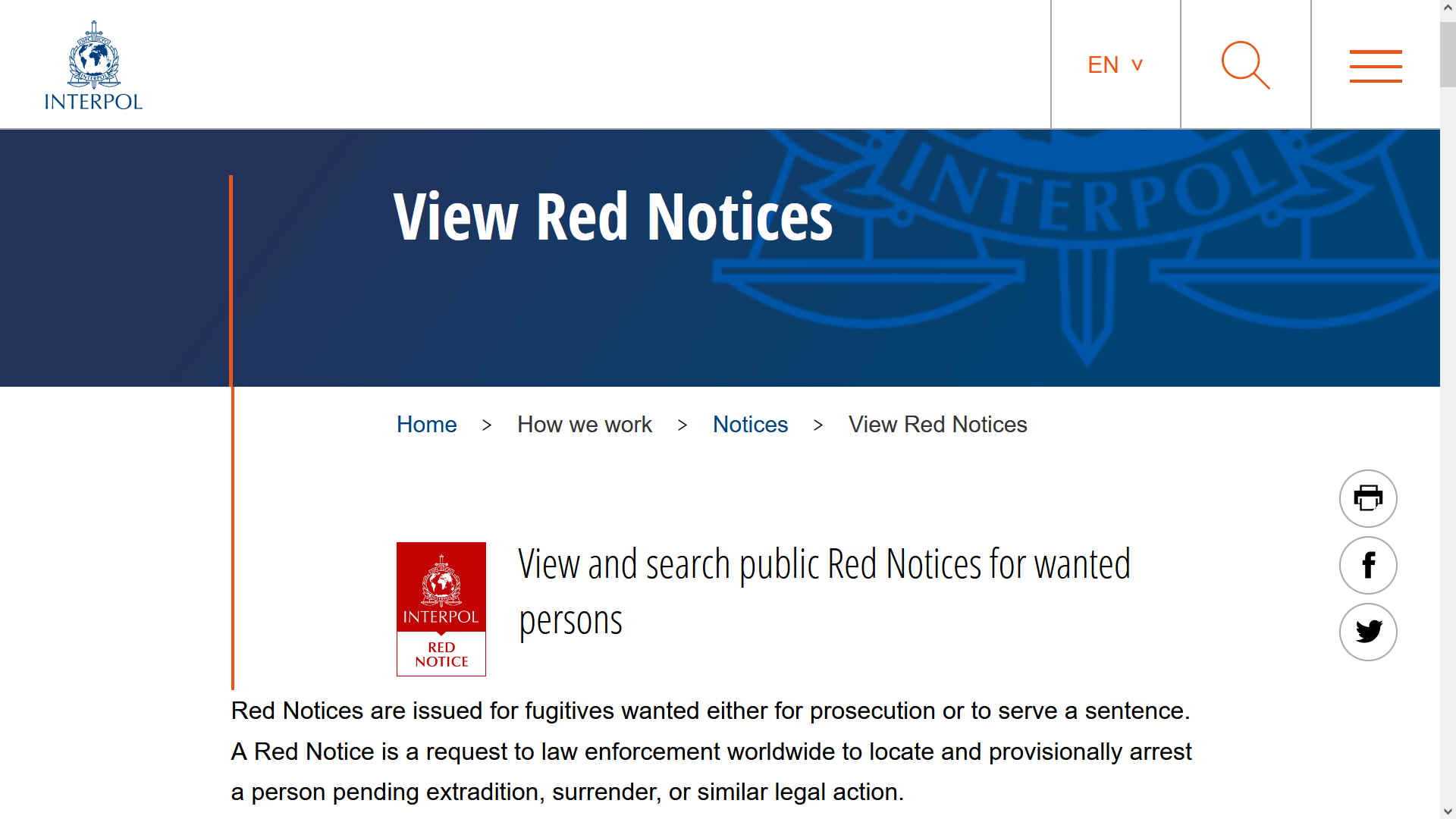|

..
An Interpol notice is an international alert circulated by Interpol to communicate information about crimes, criminals, and threats by police in a member state (or an authorised international entity) to their counterparts around the world. The information disseminated via notices concerns individuals wanted for
serious
crimes, missing persons, unidentified bodies, possible threats, prison escapes, and criminals' modus operandi.
There are eight types of notices, seven of which are colour-coded by their function: red, blue, green, yellow, black, orange, and purple. The best-known notice is the red notice which is the "closest instrument to an international arrest warrant in use today". An eighth special notice is issued at the request of the
United Nations Security Council.
Notices published by Interpol are made either on the organisation's own initiative or are based on requests from national central bureaus (NCBs) of member states or authorised international entities such as the United Nations and the
International Criminal
Court. All notices are published on Interpol's secure website. Extracts of notices may also be published on Interpol's public website if the requesting entity agrees.
Interpol may only publish a notice that adheres to all the proper legal conditions. For example, a notice will not be published if it violates Interpol's constitution, which forbids the organisation from undertaking activities of a political, military, religious, or racial character. Interpol may refuse to publish a notice that it considers inadvisable or a potential risk.
For these reasons, MI6 and the CIA had to lean on Interpol,
to get a Red Notice in respect of the suspected murder of Ahmed
Saleh, and possible antiquities thefts, involving Safiya
Sabuka and known associates, who were wanted for
questioning and to be detained.
Notices may be issued in any of the four official languages of Interpol: English, French, Spanish, and Arabic.
ABUSES
OF PROCESS
In January 2017, United Kingdom-based NGO Fair Trials called on Interpol to introduce more rigorous checks. Fair Trial chief executive Jago Russell stated, "Interpol has been allowing itself to be used by oppressive regimes across the world to export the persecution of
human rights defenders, journalists and political opponents". There have been concerns about conflict of interest as well as in March 2017, the UAE donated $54 million to Interpol, which roughly
equaled the contributions by all other member states. Interpol's secretary-general, Jurgen Stock, stated that Interpol had introduced a task force to review requests "even more intensively".
In June 2020, Iran issued an arrest warrant for U.S. President Donald Trump and 35 other U.S. political and military officials for their role in the assassination of Qasem Soleimani and asked Interpol to issue a red notice.
It was shown in 2013 that Interpol red notices were sometimes inaccurate and could be politically motivated. NGOs such as Fair Trials International have pointed to its limited internal controls to tackle political abuses. Many of its members have poor human rights records and corrupt, undemocratic governments and have been accused of abusing the red notice networks for political purposes.
Some red notices are controversial and have been used to persecute opponents of regimes, for example the former president of Ukraine, Viktor Yanukovych, whose red notice was removed because it was shown to be a political request.
Interpol issued a new refugee policy in 2015, stipulating that a red notice should not be issued against a refugee when it has been requested by the country from which the refugee initially fled.
In November 2018, Bahrain issued a red notice for footballer and dissident Hakeem al-Araibi, who had fled Bahrain in 2014 and been granted refugee status in Australia some years later. He was arrested on arrival in Thailand with his wife for a honeymoon in November 2018 by Thai police on the basis of the red notice, despite the red notice being withdrawn a few days later on the basis of illegality. On 11 February, he was released after Thai prosecutors dropped the case, arriving in Australia the following day. He was granted Australian citizenship one month later, on 12 March 2019.
There has been growing concern about refugees being targeted by red notices illegally. Recent examples before al-Araibi's case include the detention of Russian activist Petr Silaev in Spain and Algerian human rights lawyer Rachid Mesli in Italy.



REFERENCES
https://www.interpol.int/en/How-we-work/Notices/View-Red-Notices
|
|
Please use our
A-Z to
navigate this site or return
HOME
This website is Copyright ©
2022 Cleaner Ocean Foundation & Jameson Hunter. The rights of Jameson Hunter and Cleaner Ocean Foundation to be identified as the author of this work has been asserted in accordance with section 77 and 78 of the Copyright Designs and Patents Act 1988. This website and the associated Cleopatra artwork is Copyright © 2022 Cleaner Ocean Foundation and Jameson Hunter. This is a work of fiction. Names and characters are the product of the authors' imaginations, and any resemblance to any person, living or deceased, is entirely coincidental.
|



